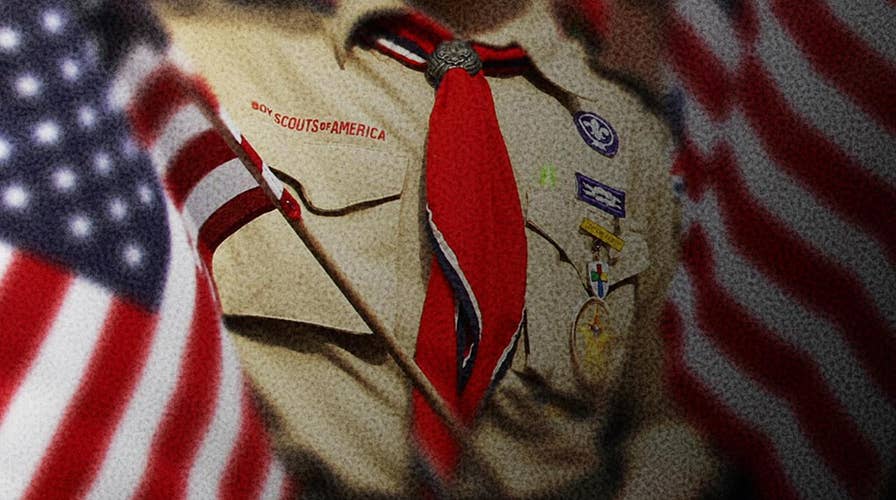Investigation exposes widespread sexual abuse by former Boy Scout leaders
The Boy Scouts of America release a statement saying they 'care deeply about all victims of child sex abuse' and 'at no time have we ever knowingly allowed a sexual predator to work with youth.'
Rain, mud, cold, dark, and an undercooked piece of meat remain the most vivid memories of my first Scout camping trip. I still marvel that I returned for a second. But I shared that momentary misery with a group of equally wet and chilly twelve-year-olds. We endured the elements together and learned how to survive. I found it blissfully authentic; I signed up again.
Unfortunately, for many people today, it is the saddening and shocking revelations of sexual abuse that now rank first in their impressions when it comes to Scouting. As an Eagle Scout and as a father, this not only breaks my heart, but it infuriates and sickens me that young people have been harmed by those willing to exploit this altruistic and important program.
PAUL BATURA: WHAT CHICK-FIL-A TAUGHT ME ABOUT LIFE
It would also infuriate me, however, if litigators who are now gearing up to revive discussion of past abuse, manage to exploit these young victims to the detriment of tomorrow’s youth by crippling a vital American institution.
I understand why many Americans may have questions about the program’s legacy and value because I once asked those same questions myself.
To discover the answers, I undertook a global quest that yielded two books: “Legacy of Honor” and “Spirit of Adventure.” I met with countless Scouts, Eagle Scouts, parents, and leaders in 44 states, on five continents, and on three oceans. And I discovered many elements of Scouting’s legacy as I learned their stories.
A young and undersized Rex Tillerson, for instance, first found confidence lugging and paddling canoes across Boundary Waters lakes. Michael Bloomberg, the only Jewish Scout in a Baptist-sponsored Scout troop, learned salesmanship by selling Christmas wreaths to fund his trips to summer camp. NYPD Special Services officer Scott Strauss crawled into smoldering rubble to rescue the last September 11 survivor because he deeply believed in the Scout credo, “Help other people at all times.” The Scout Oath’s phrase “On my honor, I will do my duty” sustained POW George Coker during seven years of brutal captivity in North Vietnam.
Matt Dalio’s Greenwich, Connecticut, Eagle Scout project led to the international adoption program China Care. Buey Tut’s project in Omaha became Aqua Africa, an organization that now provides water for villages in his native South Sudan. Without Scouting, Buey never would have graduated high school.
Consider the lives ultimately affected by these individuals. Then extend that impact across the 110 million young people who have been Scouts, two million of whom became Eagle Scouts.
Young people will say they play soccer, attend a certain school, or belong to a church. Yet they say, “I am a Scout.” In that deep-seated identity lies the power of Scouting.
The Scout program fired the imagination and broadened horizons for these young people. It equipped them to realize their potential. Perhaps most importantly, it bent their minds toward leadership and turned their hearts toward service. It steered them toward contribution and significance.
Now imagine if these kids didn’t have Scouting. That’s what is at stake today.
In the foreword he penned for “Legacy of Honor,” former Defense Secretary Robert Gates wrote, “There is much to concern us about the future of our country. Yet, because of the Boy Scouts, I remain an optimist.”
So do I.
Our country indeed faces real challenges; Scouting provides real solutions. Show me an Eagle Scout and I’ll show you someone prepared and equipped to help, someone with the bravery to fight for community or country, with the courage to stand for what’s right. Scouting raises up young men and women and impresses upon them the principles of duty, self-reliance, and personal responsibility that sustain our republic.
The Boy Scout organization led in youth protection long before sexual abuse was discussed openly. It implemented policies to keep Scouts safe and expelled those who might threaten young people. Every known case of abuse in the past 50 years has been reported to law enforcement, while policies and safeguards have continued to improve. The organization offers support and counseling to any victims, while working toward ensuring there are no more victims, period.
Last year, Scouting served 2.2 million youth, with five incidents of abuse reported. That’s five too many times a predator broke youth protection policy. Statistically, however, Scouting policies have created a vastly safer environment than youth find in the general public. Scouting’s leadership provides a positive example for other institutions currently struggling to prevent abuse.
When my long journey into Scouting ended, I felt renewed pride in the program’s legacy and sincere gratitude to the millions of adult volunteers who give unselfishly to help youth become better citizens. I found a steeled belief in Scouting’s potential to improve lives, strengthen communities, and help realize America’s promise.
CLICK HERE TO GET THE FOX NEWS APP
I hope all Americans will pause to appreciate how significantly Scouting has contributed to our past and present. The country should carefully consider the risk of litigating to death this extraordinary movement of good people and thus robbing future youth of the transformative opportunities the program provides.
Young people will say they play soccer, attend a certain school, or belong to a church. Yet they say, “I am a Scout.” In that deep-seated identity lies the power of Scouting.

